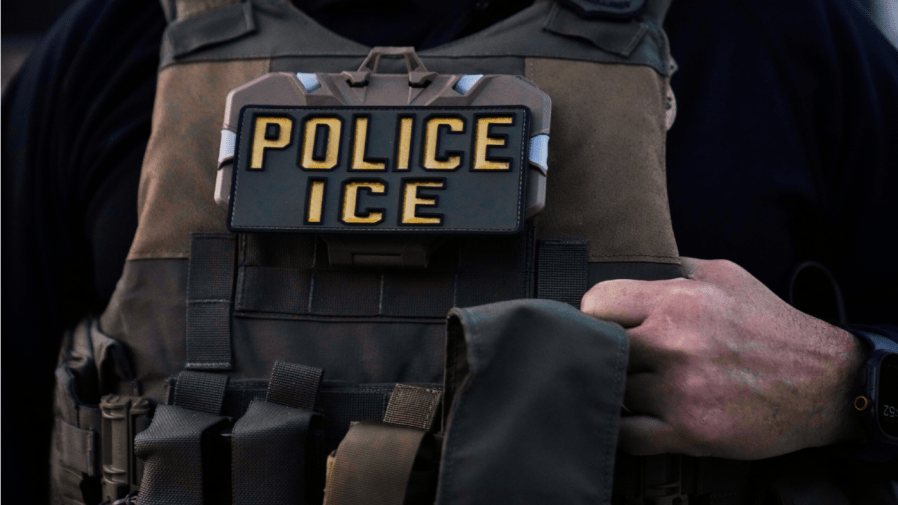
While municipalities across the country struggle to cope with the invasion of armed immigration agents, who disregard due process to detain migrants, citizens and even lawful workers, one small Illinois city — where I happen to live— has developed what Rachel Maddow calls the “Evanston Handbook” for community responsiveness.
Evanston, Illinois, is an exceptionally blue dot in a seriously blue state. Sitting on the shore of Lake Michigan, just north of Chicago, it is the home of Northwestern University’s main campus.
With a racially and economically diverse population of about 76,000, Evanston has long been known for its liberal politics, high level of education and commitment to civic engagement.
More recently, Evanstonians have drawn national attention for vigorously, but peacefully, confronting the militarized border patrol troopers who have been pulling people out of parking lots and off of streets.
Throughout the Chicago area, President Donald Trump’s “Midway Blitz” has been using helicopters and unmarked SUVs to detain migrants and U.S. citizens alike, including children, often for the seeming offense of “gardening while brown.”
If that sounds like an exaggeration, just read Supreme Court Justice Brett Kavanaugh’s concurrence in Noem v. Perdomo. Without evident embarrassment or self-awareness, Kavanaugh opined that “apparent ethnicity” is a “relevant factor” for an immigration stop, especially in conjunction with working in “certain kinds of jobs” such as landscaping or agriculture, and speaking Spanish or accented English.
In Evanston, “Kavanaugh stops” have been going on for weeks. In the words of Mayor Daniel Biss, federal agents have been “driving around town looking for people whose skin is brown.” Then, “they pick them up, they grab them, they abduct them, they’re gone.”
In response, as Maddow put it, “incredibly determined and resourceful, brave, no-nonsense Americans” are using whistles, phone trees and internet messages to alert each other to the presence of “armed, masked agents” in their neighborhoods.
The Evanston city government has also taken a stand, setting up a hotline with the Illinois Coalition for Immigrant and Refugee Rights, and prohibiting the use of city databases or property for immigration enforcement, other than compliance with valid warrants.
Things came to a head on Halloween, when Border Patrol agents arrested three U.S. citizens who had been monitoring their activities. According to witnesses, “a man and a woman in a red car” were following a Department of Homeland Security vehicle “to warn people of their presence.”
The agents “slammed on their brakes” in an intersection, causing a rear-end collision. With traffic stopped, the agents dragged the man and woman from their car and violently threw them to the ground.
Following the “Evanston handbook,” a crowd quickly gathered in response to a community alert. As shown in videos, the crowd kept its distance from the body-armored officers, blowing whistles and shouting at them to release their prisoners, while one protester was grabbed and arrested.
In the presence of commander-at-large Gregory Bovino, an ICE agent can be seen on video drawing and brandishing his handgun, while another punches an arrestee who is zip-tied face-down on the pavement.
Video recordings clearly contradict the Department of Homeland Security story that one of protesters grabbed an officer by the genitals. In another case, Bovino has been accused of presenting false evidence in federal court.
As the agents drove away with their prisoners (who were later released without charges), they were dogged by whistle-blowing Evanstonians from one end of town to the other. According to one detainee, the agents were visibly unnerved by the loudly coordinated community response.
Meanwhile, Evanstonians remained on the street corner, rallying in support of their neighbors. Mayor Biss spoke to the group, calling on “ICE to get the hell out of Evanston.”
A vigil the next day drew hundreds of participants. Speakers included local clergy and elected officials, including the city clerk who had labored as a migrant field worker in her childhood. Biss delivered the closing remarks, in what has become a mantra, that Evanston “will not be intimidated.”
Biss happens to be one of 17 candidates in the Democratic primary for an open seat in the U.S. Congress. He did not say a single word about the election at either of the rallies nor even wear a campaign button. Evanston unity was the watchword, with solidarity admirably taking precedence over personal political advantage.
No handbook will ever provide the key to keeping gun-waving federal agents out of a community, no matter how many rallies it facilitates. But it can marshal residents to spread the alarm and document the brutality.
Informed of DHS presence, children can stay inside their schools; street vendors, day laborers and landscapers can stay home, enduring the loss of needed income.
As explained by one Evanstonian, DHS is “just getting started. They’re going to get more violent. But we’re just getting started too, and we’re not giving up.”
Steven Lubet is the Williams Memorial Professor Emeritus at the Northwestern University Pritzker School of Law. He has lived in Evanston on and off since 1966, and continuously since 1980.


